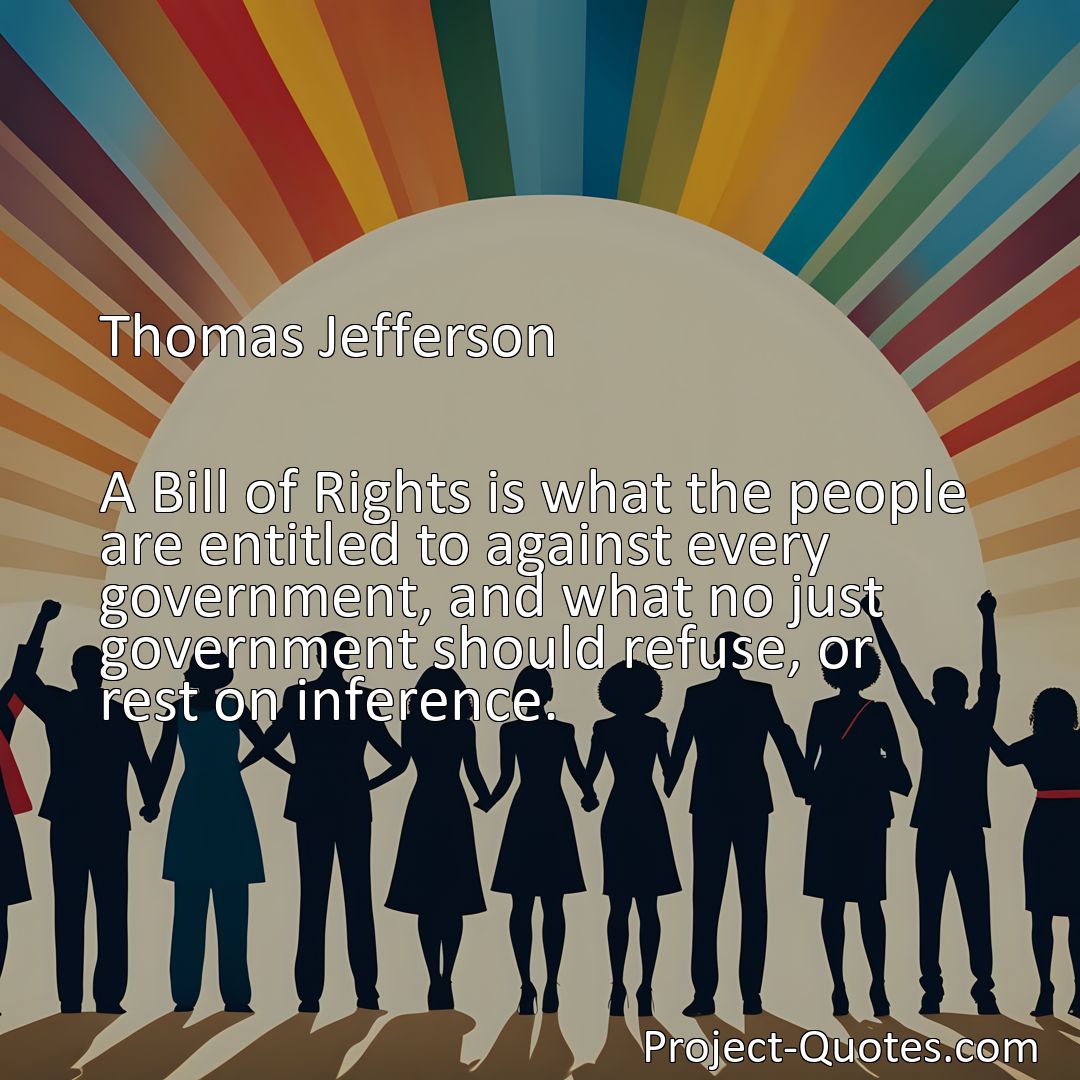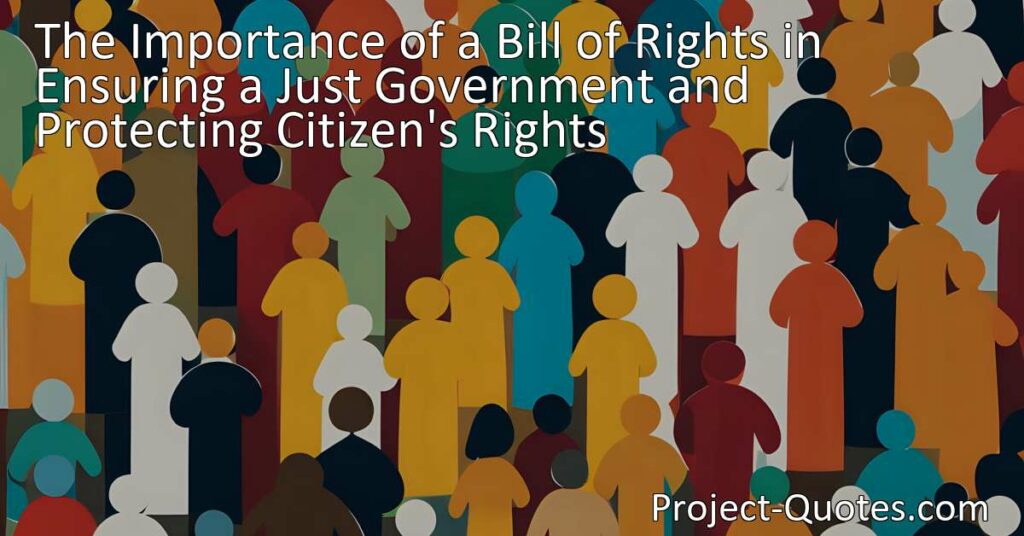A Bill of Rights is what the people are entitled to against every government, and what no just government should refuse, or rest on inference.
Thomas Jefferson
The Importance of Bill of Rights in Ensuring Justice and Protecting Citizen’s Rights: A Bill of Rights serves as a crucial protection for the rights and liberties of citizens in a democratic society. It clearly outlines the fundamental rights that individuals are entitled to, preventing any potential abuse of power by the government. A well-drafted Bill of Rights acts as a barrier against oppression and serves as a reminder of the fundamental values on which a fair and just society is built.
Table of Contents
- 1 A Bill of Rights is what the people are entitled to against every government, and what no just government should refuse, or rest on inference.
- 2 Thomas Jefferson
- 3 Meaning of Quote – A Bill of Rights is what the people are entitled to against every government, and what no just government should refuse, or rest on inference.
- 4 Freely Shareable Quote Image
- 5 Related
Meaning of Quote – A Bill of Rights is what the people are entitled to against every government, and what no just government should refuse, or rest on inference.
As an essential document within a democratic society, a Bill of Rights serves as a fundamental protection for the rights and liberties of its citizens. It establishes a clear set of rights that the people are inherently entitled to, providing a safeguard against any potential abuse of power by the government. Within this quote, the idea is emphasized that a Bill of Rights should be regarded as a necessity for every government, as it plays a crucial role in ensuring justice and preventing governmental overreach.
To fully comprehend the significance of a Bill of Rights, it is important to first understand the purpose of such a document. In essence, a Bill of Rights serves as a contract between the government and its citizens, outlining the fundamental rights and freedoms that must be respected and protected. By explicitly stating these rights, it leaves no room for ambiguity or interpretation, leaving no doubt as to what citizens are entitled to.
The concept of a Bill of Rights can be traced back to the origins of democracy itself. Many democratic societies throughout history have recognized the importance of protecting individual rights and liberties. This recognition stems from the understanding that governments, regardless of their intentions, have the potential to become oppressive if left unchecked. As a safeguard against such abuse of power, a Bill of Rights acts as a barrier, clearly outlining the limits and boundaries of governmental authority.
One of the core principles behind the concept of a Bill of Rights is that the rights and freedoms it enshrines are not granted by the government, but are inherently possessed by the people. This is an important distinction to make, as it reinforces the idea that these rights are natural and fundamental to every individual, regardless of their societal status or position. Therefore, a just government should never refuse to recognize or protect these rights, as they are not privileges to be bestowed, but rather inherent entitlements.
Moreover, a Bill of Rights should not be merely inferred or assumed. It should be explicitly and unambiguously stated in order to leave no room for misinterpretation or potential abuse. By resting on inference, a government leaves the door open for manipulation and neglect of the rights and liberties it should be protecting. This quote emphasizes the necessity of a clear and comprehensive Bill of Rights, void of any ambiguity or loopholes.
A well-drafted Bill of Rights plays a crucial role in maintaining a fair and just society. It acts as a check on governmental power, ensuring that individual liberties are protected and respected. By providing a clear framework for the rights of citizens, it enables individuals to exercise their freedoms without fear of encroachment. Furthermore, a Bill of Rights acts as a guiding principle, reminding both citizens and government officials of the fundamental values upon which a democratic society is built.
At its core, a Bill of Rights serves to strike a delicate balance between the needs of society as a whole and the rights of the individuals within it. It recognizes that while some limitations on individual freedoms may be necessary for the greater good, these restrictions should always be carefully evaluated and justified. By outlining these rights and restrictions, a Bill of Rights ensures that any infringement on individual liberties is subject to scrutiny and debate, preventing arbitrary and unjust actions by the government.
One of the most crucial aspects of a Bill of Rights is its ability to provide protection against potential abuses of power. By setting clear boundaries for governmental authority, it establishes a system of accountability, whereby any actions that infringe upon the rights of citizens can be challenged and rectified. A well-functioning democracy relies on the ability of its citizens to hold their elected officials accountable, and a Bill of Rights provides the necessary tools for this process.
In addition to safeguarding individual rights, a Bill of Rights contributes to the stability and social cohesion of a nation. By clearly defining the parameters of acceptable behavior and living standards, it fosters a sense of security and trust among the population. When individuals are confident that their rights and freedoms are protected, it enables them to fully participate in civic life and contribute to the overall well-being of society. This, in turn, leads to a more harmonious and prosperous nation.
Furthermore, a Bill of Rights serves as a beacon of hope and inspiration for those living in oppressive regimes. It highlights the possibilities that exist when individuals are granted the freedoms and liberties they deserve. By providing a model for other nations to emulate, it sets an example of what a just and fair society can achieve.
In conclusion, a Bill of Rights is not merely a document, but a crucial component of a functioning democracy. By explicitly stating the rights and freedoms of citizens, it establishes a clear framework for a just government. This quote emphasizes the necessity of such a document, asserting that a truly just government should recognize and protect the rights of its citizens without relying on assumptions or inference. By understanding the importance of a Bill of Rights and actively upholding its principles, we can strive towards a society where the rights, dignity, and freedom of every individual are respected and protected.
I hope this quote inspired image brings you hope and peace. Share it with someone who needs it today!


